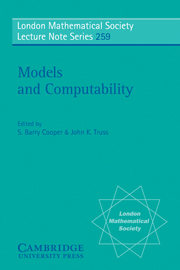Book contents
- Frontmatter
- Contents
- Preface
- Continuous Functionals of Dependent and Transfinite Types
- Degree-Theoretic Aspects of Computably Enumerable Reals
- Simplicity and Independence for Pseudo-Algebraically Closed Fields
- Clockwork or Turing U/universe? - Remarks on Causal Determinism and Computability
- A Techniques Oriented Survey of Bounded Queries
- Relative Categoricity in Abelian Groups
- Computability and Complexity Revisited
- Effective Model Theory: The Number of Models and Their Complexity
- A Survey on Canonical Bases in Simple Theories
- True Approximations and Models of Arithmetic
- On the Topological Stability Conjecture
- A Mahlo-Universe of Effective Domains with Totality
- Logic and Decision Making
- The Sheaf of Locally Definable Scalars over a Ring
- Human Styles of Quantificational Reasoning
- Recursion Theoretic Memories 1954–1978
- Fields Definable in Simple Groups
- A Combinatory Algebra for Sequential Functionals of Finite Type
- Model Theory of Analytic and Smooth Functions
Preface
Published online by Cambridge University Press: 17 May 2010
- Frontmatter
- Contents
- Preface
- Continuous Functionals of Dependent and Transfinite Types
- Degree-Theoretic Aspects of Computably Enumerable Reals
- Simplicity and Independence for Pseudo-Algebraically Closed Fields
- Clockwork or Turing U/universe? - Remarks on Causal Determinism and Computability
- A Techniques Oriented Survey of Bounded Queries
- Relative Categoricity in Abelian Groups
- Computability and Complexity Revisited
- Effective Model Theory: The Number of Models and Their Complexity
- A Survey on Canonical Bases in Simple Theories
- True Approximations and Models of Arithmetic
- On the Topological Stability Conjecture
- A Mahlo-Universe of Effective Domains with Totality
- Logic and Decision Making
- The Sheaf of Locally Definable Scalars over a Ring
- Human Styles of Quantificational Reasoning
- Recursion Theoretic Memories 1954–1978
- Fields Definable in Simple Groups
- A Combinatory Algebra for Sequential Functionals of Finite Type
- Model Theory of Analytic and Smooth Functions
Summary
Basic science, and within that pure mathematics, has a unique ability to surprise and change our view of the world we live in. But more often than not, its fundamental ‘relevance’ has emerged in ways impossible to have anticipated. As has often been remarked, that of the best basic science (say of non-Euclidean geometry, or of Hilbert spaces, or of the universal Turing machine) is independent of limited views of potential applicability.
Logic Colloquium '97, held in Leeds, England, 6th – 13th July, 1997, set out to reflect all that was best in contemporary logic, and Models and Computability and Sets and Proofs comprise two volumes of refereed articles, mainly based on the invited talks given at that meeting. Thanks to the programme committee (its other members being George Boolos, Sam Buss, Wilfrid Hodges, Martin Hyland, Alistair Lachlan, Alain Louveau, Yiannis Moschovakis, Leszeck Pacholski, Helmut Schwichtenberg, Ted Slaman and Hugh Woodin) and the special sessions organisers (Klaus Ambos-Spies, Sy Friedman, Wilfrid Hodges, Gerhard Jaeger, Steffen Lempp, Anand Pillay and Helmut Schwichtenberg), the editors have been able to call on a rich and distinguished array of authors. It is of great regret that one of our programme committee members was not able to see the success to which he had substantially contributed, and the British Logic Colloquium Lecture, given by Paul Benacerraf, took the form of a tribute to his memory.
- Type
- Chapter
- Information
- Models and Computability , pp. vii - xPublisher: Cambridge University PressPrint publication year: 1999

